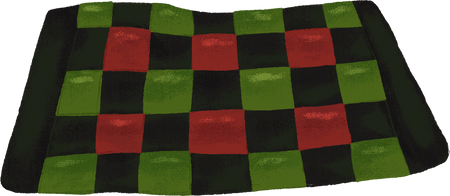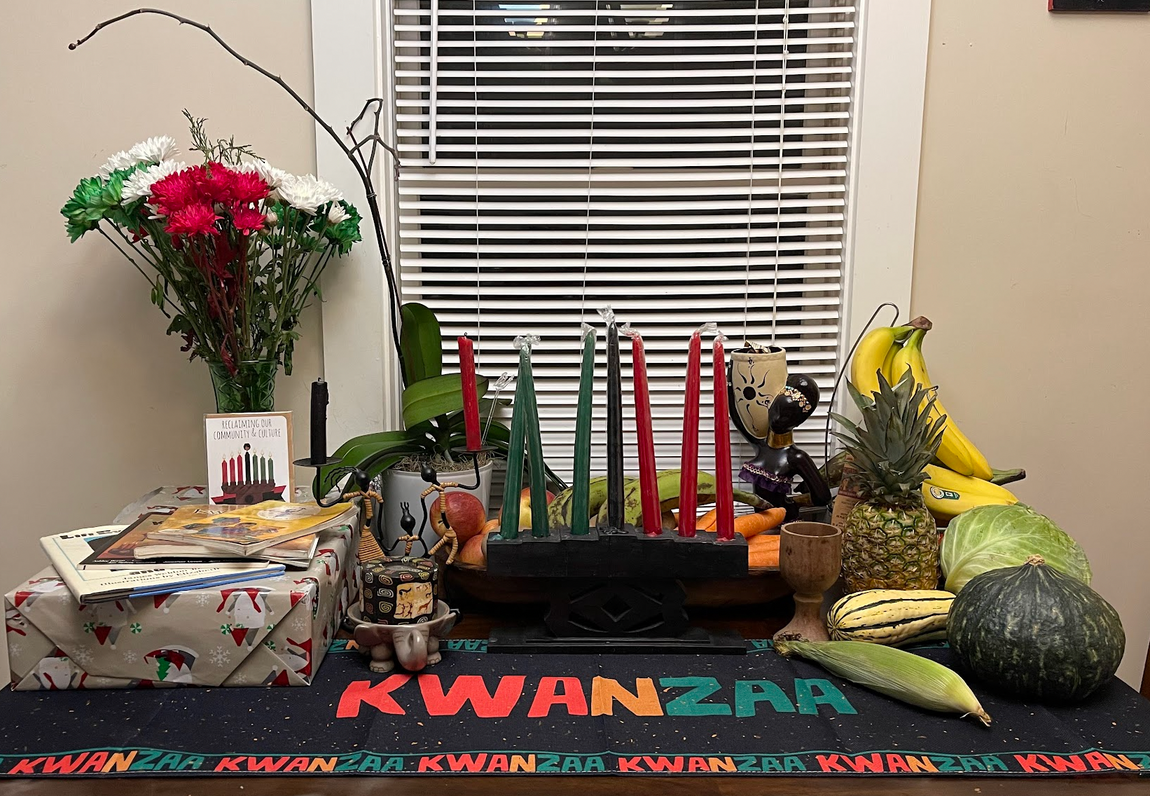KWANZAA
FOR
EVERYBODY
A CARD DECK DESIGNED TO GUIDE YOUR CELEBRATION AND PRACTICE OF KWANZAA
developed by Renée Omoaldé
KWANZAA
FOR
EVERYBODY
A CARD DECK DESIGNED TO GUIDE YOUR CELEBRATION AND PRACTICE OF KWANZAA
developed by Renée Omoaldé
so, about Kwanzaa
Kwanzaa, celebrated December 26 - Jan 1, is the baby of national holidays celebrated in America! Created in 1966 by Dr. Maulana Ndabezitha Karenga, Kwanzaa is a non-religous and cultural celebration designed to honor, remember, and promote African values and heritage in the diaspora. Meaning first fruits of the harvest in Kiswahili, Kwanzaa was created by joining various African traditions together to form a celebration of life and the fruits of our harvest, a full year of working hard!
Kwanzaa can be celebrated by everybody and we invite you to join us in celebrating the national holiday. So, get ready for
7-days of community, fun, reverance, and celebration!
the principles
nguzo saba
The nguzo saba are the seven principles of Kwanzaa that guide our practice. Each nguzo saba is given a day on which it is commemorated and reflected upon. Even beyond the 7 days of Kwanzaa, they can be used as guiding principles for your life.
Umoja
unity
Kujichagulia
self-determination
Ujima
collecitve
work and responsibility
Ujamaa
cooperative economics
Nia
purpose
Kuumba
creativity
Imani
faith
symbols
Dr. Maluna Karenga developed seven basic symbols of Kwanzaa. These symbols give life to the African history from which he created Kwanzaa and allow for a collective community. For an authentic celebration of Kwanzaa you should have these items as a part of your Kwanzaa display.
Mazao the crops
Mkeka
the mat
Kinara
candle holder

Muhindi
corn
Kikombe cha Umjoa
the unity cup
Mishumaa Saba
the seven candles
Zawadi
the gifts
Bendera
flag
key kwanzaa terms
matunda ya kwanza - first fruits of the harvest
heri za Kwanzaa! - Happy Kwanzaa
habari gani? - what's the word?
harambee! - let's come together!
kiSwahili - the language of Kwanzaa
bendera - flag
Tamashi la Tambiko - Libation Statement
let's celebrate!
Like most holidays, Kwanzaa is best enjoyed by just celebrating! While the rich history and intricate detail of the holiday may seem overwhelming. We welcome you to open yourself and your family to a rich celebration of love over the next seven days! Beginning December 26 and ending January 1st, we will celebrate the rich history of African descendants in America and the love, culture, and community they created in a new world.
So, if you're ready to celebrate, let's discuss how to best prepare.
Heri Za Kwanzaa!
preparing for Kwanzaa
“There is a traditionally established way of celebrating Kwanzaa. We should therefore observe these guidelines to make our Kwanzaa the most beautiful and engaging one and to keep the tradition. Without definite guidelines and core values and practices there is no holiday. First, you should come to the celebration with a profound respect for its values, symbols and practices and do nothing to violate its integrity, beauty and expansive meaning. Secondly, you should not mix the Kwanzaa holiday or its symbols, values and practice with any other culture. This would violate the principles of Kujichagulia (Self-Determination) and thus violate the integrity of the holiday. Thirdly, choose the best and most beautiful items to celebrate Kwanzaa. This means taking time to plan and select the most beautiful objects of art, colorful African cloth, fresh fruits and vegetables, etc. so that every object used represents African culture and your commitment to the holiday in the best of ways.” (The Official Kwanzaa Website, officialkwanzaawebsite.org)
preparing for Kwanzaa
Kwanzaa Table

your daily practice
For each day of the seven days of Kwanzaa, there is a card to guide your practice: Here is a general outline of what your day can look like:
evening ritual
tamshi la tambiko
Our fathers and mothers came here, lived, loved, struggled and built here. At this place, their love and labor rose like the sun and gave strength and meaning to the day. For them, then, who gave so much we give in return. On this same soil we will sow our seeds, and liberation and a higher level of human life. May our eyes be the eagle, our strength be the elephant, and the boldness of our life be like the lion. And may we remember and honor our ancestors and the legacy they left for as long as the sun shines and the waters flow.
For our people everywhere then:
For Shaka, Samory, and Nzingha and all the others known and unknown who defended our ancestral land, history and humanity from alien invaders;
For Garvey, Muhammad, Malcolm, and King; Harriet, Fannie Lou, Sojourner, Bethune, and Nat Turner and all the others who dared to define, defend, and develop our interests as a people;
For our children and the fuller and freer lives they will live because we struggles;
For Kawaida and the Nguzo Saba, the new system of views and values which gives identity, purpose, and direction to our lives;
For the new world we struggle to build;
And for the continuing struggle through which we will inevitably rescue and reconstruct our history and humanity in our own image and according to our own needs.
– Maulana Karenga
To strive for and maintain unity in the family, community, nation, and race.
dec 26
umoja
symbol: dagi knot
daily reflections for everybody:
When was the last time you felt unity?
Who is someone in your life you believe exemplifies unity? What would you say to them today?
Why do you think unity is important?
evening ritual:
day 1 umoja
unity
family activities:
songs to enjoy unity
to define ourselves, name ourselves, create for ourselves and speak for ourselves.
dec 27
kujichagulia
symbol: ahenwa
kujichagulia
self-determination
daily reflections for everybody:
How do you connect to the meaning of your name?
What do you consider to be your greatest attribute?
Do you have a special talent or idea that you'd like to share with the world?
Have you ever redefined yourself? How?
family activities:
songs to enjoy
To build and maintain our community together and make our brother's and sister's problems our problems and to solve them together.
symbol: Akoma ntoaso
dec 28
ujima
ujima
collective work & responsibility
daily reflections for everybody:
Do you prefer to work alone or in teams? Why?
What's your favorite sports team and player?
What was your favorite volunteer experience?
When's the last time you worked with others to accomplish a goal?
family activities:
songs to enjoy:
To build and maintain our own stores, shops and other businesses and to profit from them together.
dec 29
ujamaa
symbol: Nsibidi
ujamaa
cooperative economics
daily reflections for everybody:
How do you (or can you) support black owned businesses?
How do/would you run your small-business?
Where do you spend money that's locally owned?
If you had $1M, how would you use it to support coopertative economics?
family activities:
songs to enjoy:
To make our collective vocation the building and developing of our community in order to restore our people to their traditional greatness.
symbol: The hieroglyph Neferi
dec 30
nia
nia
purpose
daily reflections for everybody:
What's one of your favorite things about yourself?
In the last week, what has been one of your greatest accomplishments? Month? Year?
How have you helped to restore something or someone in your life?
family activities:
songs to enjoy:
symbol: the Dogon symbol of creativity (seven vibrations of creation)
To do always as much as we can, in the way we can, in order to leave our community more beautiful and beneficial than we inherited it.
dec 31
kuumba
kuumba
creativity
daily reflections for everybody:
when are you in the most creative spirit?
what's something you created that you're the most proud of?
how have you supported the creativity of others?
when have you had to solve a difficult problem and came out with a great solution?
libation statement:
INSERT LIBATION STATEMENT
family activities:
songs to enjoy:
symbol: double symbol of ankh (life) and djed pillar (stabilitY),
jan 1
imani
To believe with all our heart in our people, our parents, our teachers, our leaders and the righteousness and victory of our struggle.
imani
faith
daily reflections for everybody:
what is the foundation of your faith?
who is someone you believe in deeply?
when is a time where you've had faith in someone or something and were let down?
why is faith important to you
libation statement:
INSERT LIBATION STATEMENT
family activities:
songs to enjoy:
Siku ya Tamuli Meditation
The last day of Kwanzaa is the first day of the new year, January 1. Historically this has been for African people a time of sober assessment of things done and things to do, of self-reflection and reflection on the life and future of the people and of recommitment to their highest cultural values in a special way.
Following in this tradition, it is for us then a time to ask and answer soberly and humbly the three Kawaida questions: Who am I; am I really who I say I am; and am I all I ought to be? And it is, of necessity, a time to recommit ourselves to our highest ideals, in a word, to the best of what it means to be both African and human in the fullest sense. (Click here for the Odu Ifa meditation)
This Day of Assessment or Day of Meditation is noted in the first-fruits celebration of the Akan by J. B. Danquah. He states that the Akan have one day during the first-fruits harvest in which they simply engage in quiet reflection. "The idea on this (day) is to maintain a quiet, humble and calm attitude with regard to oneself and towards one's neighbors." It is thus a good time for reassessment and recommitment on a personal and family level.
Closely related to this is an activity also noted by both Danquah and Sarpong, the Day of Remembrance of the ancestors or the Adae. We referred to it above as Akwasidae, but one could also use one of the days of Kwanzaa to pay special homage to the ancestors, those of the national community and those of the family. And this Day of Remembrance may also be a part of the Day of meditation or more precisely, the Day of Assessment. (Official Kwanzaa Website, officialkwanzaawebsite.com)
thank you for celebrating Kwanzaa with us!
Until next year, umoja!